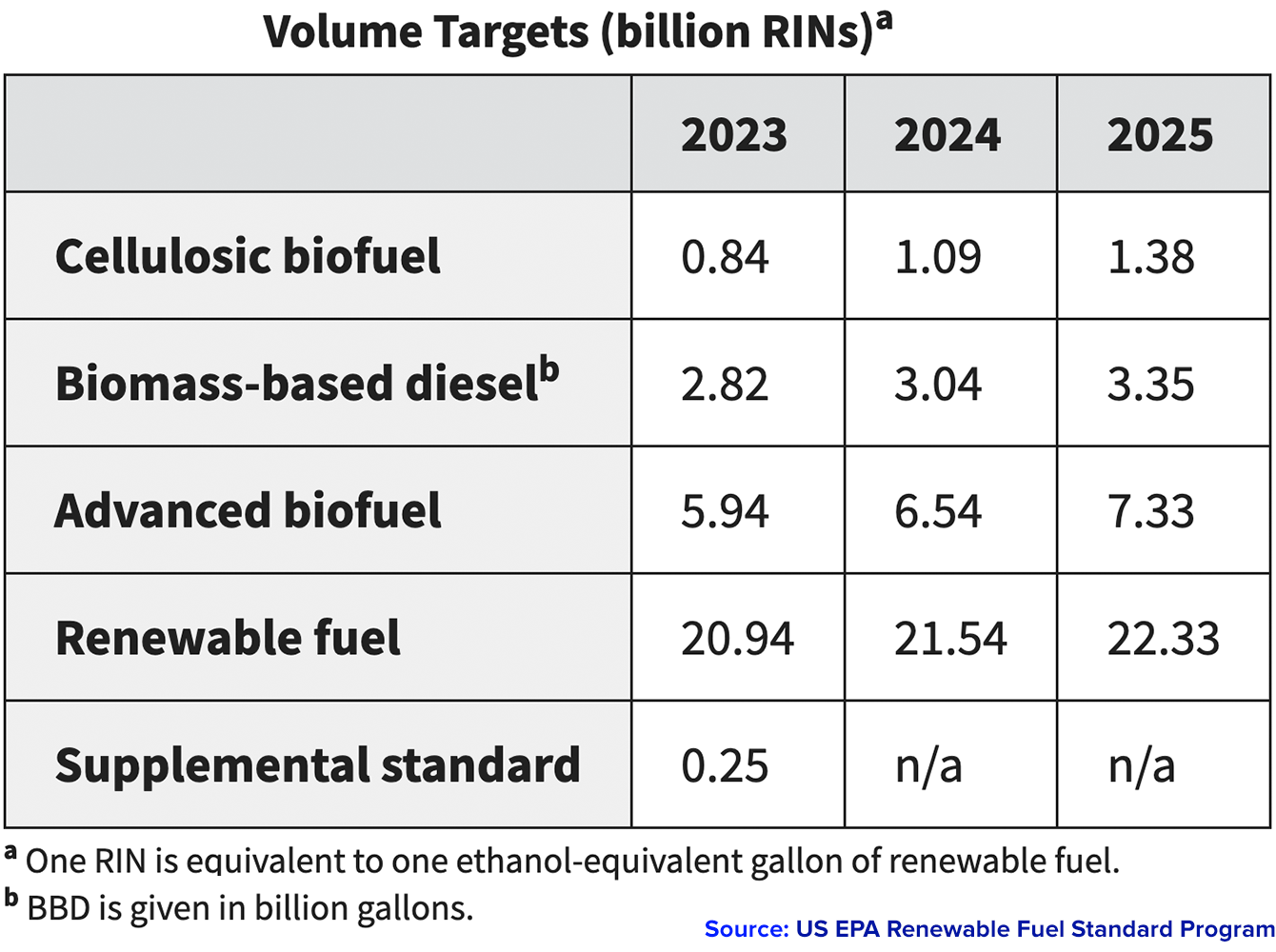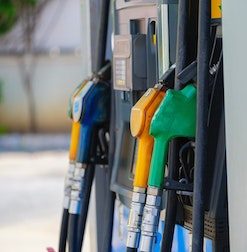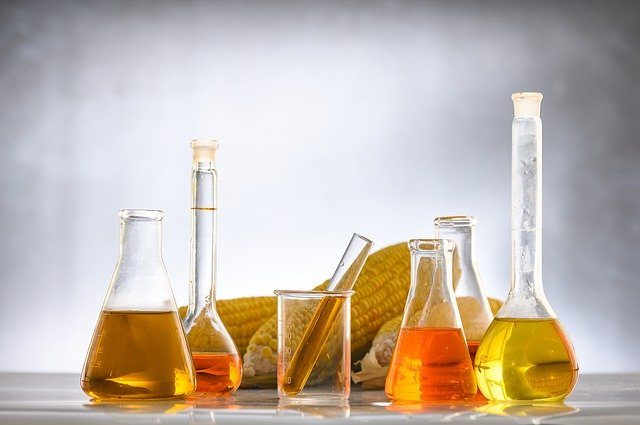The following regulations, grants and certification programs recommend or require biogenic carbon/renewable carbon content testing for biofuels.
United States
The national Renewable Fuels Standard Program (RFS) was developed to increase the volume of renewable fuel blended into gasoline and other transportation fuels. The U.S. Environmental Protection Agency (EPA) raised the Renewable Fuels Standard to 7.76% to meet the requirement that all transportation fuels sold contain a minimum of 9 billion gallons of renewable fuel in 2008, as set by the Energy Independence and Security Act of 2007 (EISA). Every year, the EPA establishes volume requirements for cellulosic biofuel, advanced biofuel, biomass-based diesel and total renewable fuel.

Under the program, fuel producers generate Renewable Identification Numbers (RINs) they can use for both credit trading and compliance demonstration.
Companies using municipal solid waste (MSW) as feedstock for RIN-generating renewable fuel production may determine the biogenic fraction of the fuel by ASTM D6866 testing.
Sources:
Regulation of Fuels and Fuel Additives: Changes to Renewable Fuel Standard Program (PDF) – Federal Register (March 2010) Vol. 75, No. 58 (Page 14715)
Low Carbon Fuel Standard Programs in the US
Low Carbon Fuel Standard (LCFS) programs are designed to decrease the carbon intensity of a state’s fuel supply by requiring suppliers to purchase credits corresponding to fossil fuels they sell and offering tax incentives to those providing renewable options.
A critical component of LCFS programs is the reporting and verification mechanisms they use, such as biogenic carbon testing using ASTM D6866 method.
As of May 2023, only the LCFS programs in California and Oregon require biogenic carbon testing by ASTM D6866.
Sources:
California Air Resources Board – Low Carbon Fuel Standard
Oregon Department of Environmental Quality – Oregon Clean Fuels Program
Read more: Low Carbon Fuel Standard Programs in the US & Canada
Canada
In July 2022, the Canadian Ministry of Environment and Climate Change published its official Quantification Method for Co-processing in Refineries under its Clean Fuel Regulations (CFR). The objective of the CFR is to require by 2030 that primary suppliers, such as producers and importers of gasoline and diesel, reduce the carbon intensity of diesel and gasoline by 15% or below 2016 levels.
Registered refineries can follow this quantification method to have their co-processing CO₂ Emissions Reduction projects recognized and gain credits for the production of low CI fuels under the CFR. This QM is applicable to co-processing done in either a hydrotreater or a fluid catalytic cracker. All co-processing projects must be in Canada.
How Co-Processing Refineries Obtain Credits under the CFR
Sources:
Canada’s Ministry of Environment and Climate Change: What are the Clean Fuel Regulations? (Last modified July 2022)
Clean Fuel Regulations: Quantification Method for Co-processing in Refineries (Version 1.0 – July 2022)
– British Columbia
British Columbia’s Low Carbon Fuel Standard (LCFS) program proposed an updated protocol in October 2023, adding ASTM D6866 testing for all co-processed fuels and co-products. The current version of British Columbia’s LCFS started on January 1, 2023, as a revamp of the program that started in 2008. The British Columbia Ministry of Mines, Energy and Low Carbon Innovation administers the LCFS.
Source:
B.C. Low Carbon Fuel Standard: Coprocessing Methodology Protocol (October 2023)
– Ontario

Under the Environmental Protection Act, starting January 1, 2017, the province of Ontario recommends fuel suppliers to use ASTM D6866 testing to determine biogenic carbon content of cellulosic ethanol derived from MSW. According to Ontario Regulation 535/05, the composite sample tested will be comprised of samples collected weekly during a quarterly period.
Similarly, suppliers of diesel and blended diesel in Ontario can use ASTM D6866 testing to determine the bio-based carbon content of diesel derived from MSW.
Sources:
O. Reg. 535/05: Ethanol in Gasoline (revoked in November 2020, replaced by O. Reg. 663/20)
O. Reg. 226/18: Greener Diesel – Bio-based Content Requirements for Diesel Fuel
The Netherlands
The Dutch Emissions Authority’s Hydrotreated Vegetable Oil (HVO) Regulation takes effect starting October 1, 2021. Under this regulation, Carbon-14 analysis is required to validate the accuracy of HVO and other fuels with biogenic content. Testing must be done by an ISO 17025-accredited laboratory.
Control tolerance set by the Dutch Emissions Authority for HVO producers:
- For blends of 25% or higher – The control tolerance is 3% of the expected value. If the expected value is 100%, a sample should have at least 97% biogenic content.
- For blends lower than 25% – The control tolerance is 1% of the expected value.
Source: Nederlandse Emissieautoriteit – HVO-kader
EU Voluntary Certification Schemes
These certification programs demonstrate compliance with the sustainability criteria for biofuels in accordance to EU fuel quality and renewable energy directives.
International Sustainability and Carbon Certification (ISCC)
To be compliant with the ISCC, two requirements must be fulfilled for the simultaneous co-processing of sustainable bio and fossil feedstocks:
- the bio-based share must meet the sustainability requirements and greenhouse gas emission requirements as indicated in ISCC documents 202 and 205 for ISCC EU certifications; and
- calculation of the bio-output, wherein the amount of incoming bio-inputs is multiplied with the relevant bio-yield
The ISCC identified three approaches in the calculation of bio-yield, one of which is Carbon-14 measurements based on analytical standards ASTM D6866.
Source:
ISCC 203-01: Guidance for the Certification of Co-Processing version 2.0 (PDF)
Roundtable on Sustainable Biomaterials (RSB)
The Roundtable on Sustainable Biomaterials offers several certifications for products which contain renewable biobased content. In December 2022, the RSB released version 2.5 of its Standard for Advanced Fuels as part of its Global Fuel Certification. RSB’s Global Fuel Certification is composed of a variety of methodologies and procedures that describe how to produce fuels from biobased and advanced feedstocks “in a way that enhances long-term environmental and social outcomes.”
The RSB’s Standard for Advanced Fuels instructs producers to measure the biobased content in their fuels by using radiocarbon-based methods following the ASTM D6866, EN 16785-1 or ISO 16620-4 standards. While the RSB’s Global Fuel Certification allows for mass balance calculations, unlike in other cases, this program does not allow producers to assign the sustainability characteristics of their inputs to the outputs produced however they choose. For cases of co-processing, the Standard only accepts radiocarbon analysis.

The RSB’s Global Fuel Certification applies to fuels produced from primary biomass (oil crops), biomass from end-of-life products and production residues, fossil-based end-of-life products, renewable liquid and gaseous fuels of non-biological origin, and co-processing biogenic and fossil fuels.
Other certifications offered by the RSB include fuel certifications specific to regulatory programs such as the EU’s Renewable Energy Directive and Carbon Offsetting and Reduction Scheme for International Aviation (CORSIA), a Global Advanced Products Certification and a biomass certification specific to Japan’s Feed-in Tariff program.
Sources:
RSB Standard for Advanced Fuels – RSB-STD-01-010 Version 2.6 (PDF)
RSB Global Fuel Certification
Renewable Energy Directive Methodology Update for Biogenic Content Testing and Verification
In June 2023, the European Commission adopted a revised methodology for calculating the biogenic content of biofuels and biogas under the Renewable Energy Directive (RED). The new methodology updates the requirements for regulated entities to verify their reported volumes, specifically by increasing obligations to measure biogenic content via carbon-14 testing.
Biogenic Content Testing
The RED charts a path to renewable energy comprising 14% of energy consumed in transport by 2030, which regulated entities are required to comply with. Biofuels and biogas producers whose products are co-processed have the choice to demonstrate compliance by either directly testing biogenic content via the carbon-14 method or through mass balance calculations based on the feedstocks used. Prior to this update, these methods of quantifying biogenic content were considered equally acceptable under the RED.
What’s New?
Under the new rule, regulated entities will have more options for calculating their biogenic content. However, these different paths will no longer be considered equal in terms of the additional verification required. The path for direct testing using carbon-14 analysis will remain the same and is considered the “main common harmonized test method” under the new rule. Mass balance calculations are still an approved path and the new rule will also allow regulated entities to use energy balance or yield methods to calculate their biogenic content. However, all of these will now require some combination with direct carbon-14 testing.
The initial process of reporting biogenic content is the same regardless of whether a regulated entity is using a primary or secondary verification method. The difference is that when using mass balance, energy balance or yield method calculations, operators will be required to regularly use direct carbon-14 testing of their outputs to verify their calculation methods and results. Even further, the new rule requires carbon-14 testing to verify all outputs claiming a specific carbon-based bio-content.
For operators using carbon-14 as a secondary verification method, when a deviation of 1% or greater is found from their calculated values, the lower of the two applies. The frequency required for verification via carbon-14 analysis is flexible and only needs to be sufficient that at any time an operator’s claims of biogenic content reflect their actual levels.
Sources:
European Commission – Renewable Energy– Method for Calculating the Share of Renewables in the Case of Co-Processing. (June 2023)
European Commission – Renewable Energy Directive– Recast to 2030.
Note: Beta Analytic provides biobased content testing for transportation fuels. The lab is not affiliated with any of the aforementioned institutions or programs.
Page last updated: November 2023